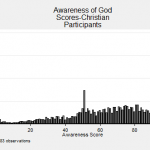 As Margarita Mooney so ably put forth in a previous post, Sociology is in need of an attitude adjustment (my words, not hers). Namely, the focus of so much sociology is on the problems of society (in fact, many sociological courses are taught as a variation of the theme social problems), but this shunts aside an equally interesting and important question: What makes people, groups, and society prosper? We shouldn’t just assume that the solutions in society are simply the reverse of the causes of its problems, for causation isn’t always symmetrical.
As Margarita Mooney so ably put forth in a previous post, Sociology is in need of an attitude adjustment (my words, not hers). Namely, the focus of so much sociology is on the problems of society (in fact, many sociological courses are taught as a variation of the theme social problems), but this shunts aside an equally interesting and important question: What makes people, groups, and society prosper? We shouldn’t just assume that the solutions in society are simply the reverse of the causes of its problems, for causation isn’t always symmetrical.
This inquiry into a “positive” sociology (which is unrelated to positivism) is challenging in sociology because like to think at so many levels of analysis–including the individual, small group, organization, culture, and society. So, what one definition of positive sociology will span all levels? Beats me.
Starting at the micro-level, sociologist Cory Keyes, of Emory, has identified 13 dimensions along with individual-level well-being varies. He terms this flourishing. (He actually coined the term in this context, so he did flourishing before flourishing was cool).
- Regular positive affect–cheerful, happy, good spirits, etc… over the last 30 days
- Avowed happiness–feels happy
- Self-acceptance–Holds positive attitude toward onself
- Social acceptance–positive attitudes toward others
- Personal growth-shows insight into own potential, development
- Social actualization-believes groups can evolve positively
- Purpose in life–holds goals and believes that affirm a sense of direction and meaning in life
- Social contribution–feels that one’s life is useful to society
- Environmental mastery–can manage complex environments
- Social coherence–Interested in society or social life, feels they are intelligible and meaningful
- Autonomy–Exhibits self-direction, resists unsavory social pressures
- Positive relations with others—Warm, satisfying, trusting personal relationships
- Social integration–Sense of belonging in a community, comfort and support from others
 What strikes me as I read this is how inherently social well-being is. About half of these are explicitly social, and the remaining are certainly affected by social factors. Linking these dimensions to larger social processes seems a promising approach to advancing a positive sociology.
What strikes me as I read this is how inherently social well-being is. About half of these are explicitly social, and the remaining are certainly affected by social factors. Linking these dimensions to larger social processes seems a promising approach to advancing a positive sociology.
If nothing else, these 13 dimensions give us a powerful tool to assess how we and others are doing in life.











